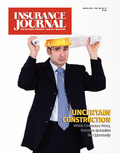Standard & Poor’s Ratings Services announced that it has lowered its long-term counterparty credit and insurer financial strength ratings on the world’s largest reinsurance group, Munich Reinsurance Co. and related entities, including its primary insurance group, Ergo, to ‘AA+’ from ‘AAA’ with a “stable” outlook.
S&P also lowered its long-term counterparty credit ratings on Ergo Versicherungsgruppe AG, the holding company for the Ergo group, to ‘AA’ from ‘AA+’, also with a “stable” outlook.
The rating agency explained its action as a consequence of Munich Re’s “reduced level of capitalization and the fact that, despite underlying improvements in the results of the reinsurance business, its earnings performance has been disappointing recently, hit by a combination of adverse factors.”
The announcement follows by two days A.M. Best’s decision to affirm the ‘A++’ (Superior) financial strength ratings of Munich Re and its core subsidiaries, albeit with a “negative” outlook. (See IJ Website Dec. 9)
Of the four largest reinsurance groups, Munich Re, Swiss Re, Employers Re and Berkshire Hathaway’s General & Cologne Re and National Indemnity, all of which were rated ‘AAA’ by S& P as recently as last April, only Berkshire has managed to retain the coveted triple ‘A’ designation.
As the latest big reinsurer to be downgraded Munich Re epitomizes the combination of lower global equity values, combined with demands to strengthen reserves, that has affected the entire industry. “Munich Re’s capital adequacy is no longer supportive of Standard & Poor’s highest ratings,” said S&P credit analyst Wolfgang Rief.
He tempered his analysis with the observation that “the group’s financial leverage is very low, and the quality of its franchise means that raising capital, both debt and equity, would remain an available option for the group despite the difficult capital market conditions.”
S&P noted that “Munich Re’s capital strength and financial flexibility have been considerably weakened by the effects of the volatile capital markets, as well as by the group’s below-target profitability.” It also observed that “this has been compounded by the group’s substantial exposure to German insurer Allianz AG (Allianz; AA/Negative/A-1+) and to the troubled German banking sector.”
The report pointed out that around 10 percent of the group’s investments are comprised of stakes in members of Allianz, which has the same financial problems as Munich Re and other German companies, most importantly the weakened condition of the country’s banks.
Munich Re’s writedowns in the value of its investments was another factor cited by S&P, as well as the fact that, “overall profitability has recently been disappointing.” While the group had a nine-month operating profit of 3.2 billion Euros, (the value of the Euro is currently at approximate parity with the dollar) it was negatively affected by the 1.973 billion Euro writedown in the value of its portfolio and the necessity to strengthen reserves at its U.S. subsidiary, American Re by 1.809 billion Euros. On top of that it estimates losses from last summer’s floods in Germany and Eastern Europe at around $250 million Euros.
The analysis wasn’t all negative. S&P noted “clear signs of improvement in the group’s underlying profitability,” but indicated that its current combined ratio of 105.7 “indicates a slower-than-expected recovery.”
“The ratings continue to reflect Munich Re’s position as a leading worldwide reinsurer, with a first-class global reputation. The group leads many of the markets in which it operates, and, because of its substantial capacity and comprehensive underwriting skills, it is benefiting from large cedents’ ‘flight to quality’ in the global reinsurance market,” said the bulletin. “Standard & Poor’s expects Munich Re to exploit this franchise strength in the medium term.”
Citing “underlying market fundamentals” and its “dominant market position,” S&P concluded that “the group is expected to produce very strong earnings in 2003 and 2004.” It expects to see the combined ratio fall to under 100 percent, in line with the company’s “stated objective of achieving a combined ratio of 104% across the cycle.” It also expects Munich Re’s capital to “be restored to levels consistent with the ratings in the medium term.”
Topics Reinsurance
Was this article valuable?
Here are more articles you may enjoy.


 As Hurricane Season Picks Up, Key Forecasting Tool Access Set to End
As Hurricane Season Picks Up, Key Forecasting Tool Access Set to End  Racketeering Suit Alleges NY Insurance Fraud Scheme by Lawyers, Medical Providers
Racketeering Suit Alleges NY Insurance Fraud Scheme by Lawyers, Medical Providers  General Mills Changing Nature Valley Labels After Lawsuit’s Herbicide Claim
General Mills Changing Nature Valley Labels After Lawsuit’s Herbicide Claim  US E&S Growth Slowed Again in ’24; Berkshire, AIG Top Premium Rankings
US E&S Growth Slowed Again in ’24; Berkshire, AIG Top Premium Rankings 

